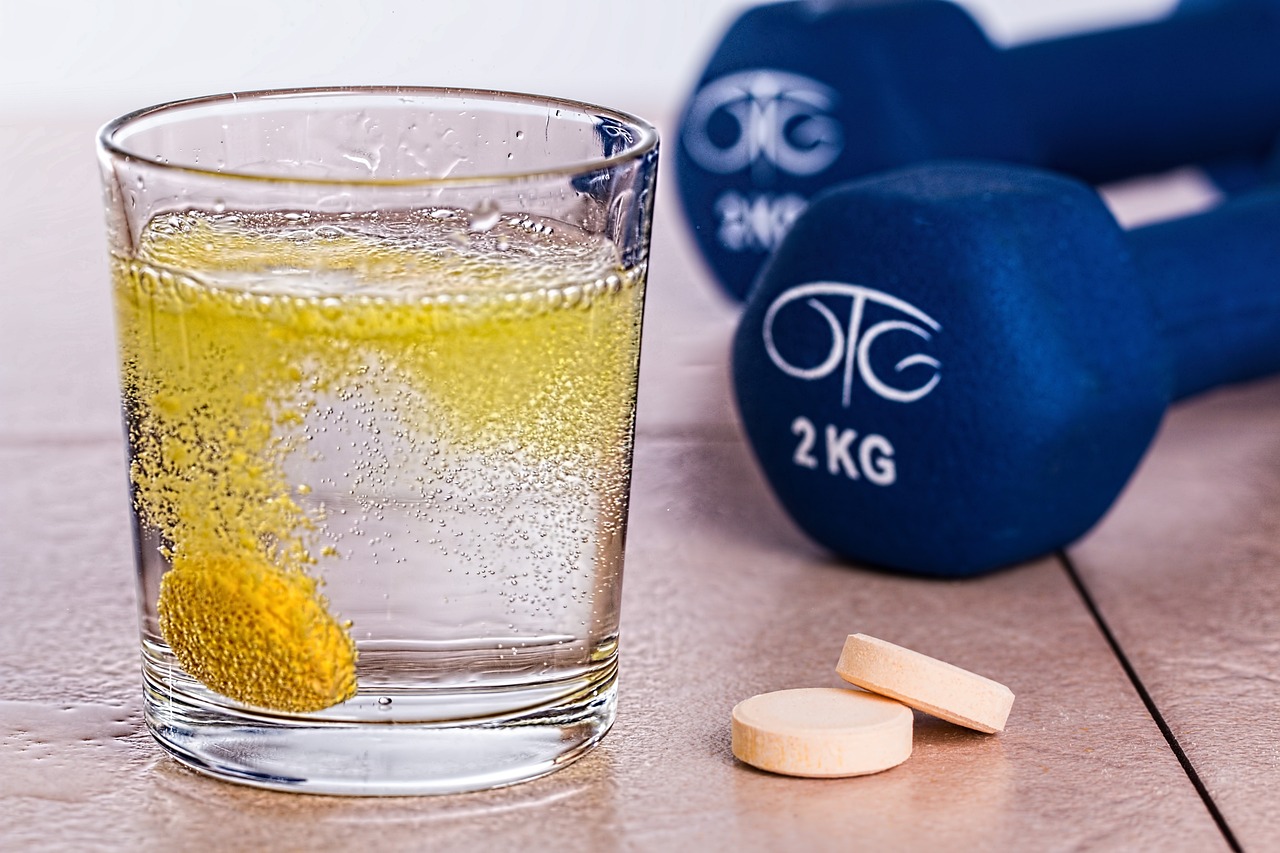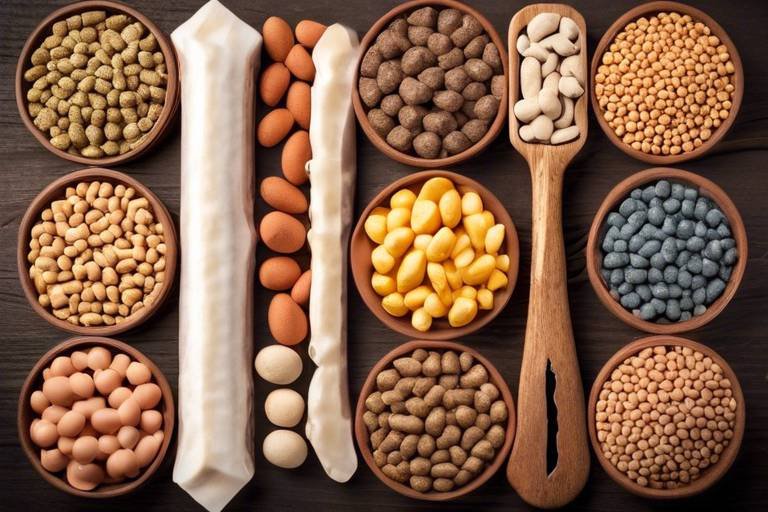How to Spot and Treat Nutritional Deficiencies
In today's fast-paced world, maintaining our health can sometimes feel like a daunting task. With the abundance of food options available, it’s easy to overlook the importance of a balanced diet. However, nutritional deficiencies can sneak up on us, leaving us feeling tired, weak, and unwell. Recognizing the signs of these deficiencies is crucial for early intervention and optimal health. This article dives deep into how to spot and treat nutritional deficiencies, empowering you to take charge of your well-being.
So, how do you know if your body is missing out on essential nutrients? Recognizing the symptoms of nutritional deficiencies is the first step toward addressing them. Common signs include:
- Fatigue: Feeling unusually tired or lethargic can be a telltale sign of a deficiency.
- Weakness: A general sense of weakness or lack of energy might indicate that your body isn’t getting what it needs.
- Changes in skin or hair health: Noticeable changes such as dry skin, hair loss, or brittle nails can signal underlying dietary issues.
These symptoms can be subtle at first, almost like whispers from your body, urging you to pay attention. If you start noticing any of these signs, it’s time to investigate further.
While there are many vitamins and minerals that our bodies require, certain deficiencies are more common than others. Here’s a look at three of the most frequently encountered deficiencies:
| Nutrient | Common Symptoms | Health Risks |
|---|---|---|
| Vitamin D | Fatigue, bone pain | Weak bones, increased risk of infections |
| Iron | Shortness of breath, pale skin | Iron deficiency anemia, fatigue |
| Calcium | Muscle cramps, brittle nails | Osteoporosis, dental problems |
Understanding these common deficiencies can help you take proactive steps toward improving your diet and overall health.
Vitamin D is often referred to as the "sunshine vitamin" because our bodies produce it when exposed to sunlight. It plays a vital role in bone health and supports immune function. If you’re feeling unusually fatigued or experiencing bone pain, you might want to check your vitamin D levels. This is particularly important for those living in areas with limited sunlight.
To boost your vitamin D intake, consider incorporating the following natural sources into your diet:
- Sunlight: Aim for about 15-30 minutes of sun exposure a few times a week.
- Fatty fish: Salmon and mackerel are excellent sources.
- Fortified foods: Many dairy products and cereals are fortified with vitamin D.
By understanding these sources, you can enhance your intake and mitigate the risks associated with deficiency.
If dietary sources aren’t enough, supplements can be a viable option. However, it’s essential to consult with a healthcare provider to determine the appropriate dosage for your individual needs.
Iron is crucial for transporting oxygen in the blood, and its deficiency can lead to a condition known as iron deficiency anemia. Symptoms may include shortness of breath, pale skin, and even dizziness. Ensuring adequate dietary intake of iron is vital for maintaining energy levels and overall health.
Now that you’re aware of the signs and common deficiencies, how can you accurately diagnose these issues? Medical tests play a significant role in identifying nutritional deficiencies. Blood tests and dietary assessments are effective methods for pinpointing specific nutrient shortfalls.
Blood tests can measure levels of various vitamins and minerals, providing a clear picture of your nutritional status. Regular testing is especially beneficial for individuals at risk of deficiencies, such as vegetarians, pregnant women, or those with chronic health conditions.
Evaluating your dietary habits is another critical step. Keeping a food diary can help you track your intake and identify potential gaps in your nutrition. Consulting with a nutritionist can also facilitate better dietary choices and improvements, steering you toward a more balanced and healthful diet.
1. How can I tell if I have a nutritional deficiency?
Look for symptoms like fatigue, weakness, or changes in skin and hair health. If you suspect a deficiency, consult a healthcare provider for testing.
2. Can I get enough nutrients from diet alone?
While it’s possible, many people struggle to meet their nutritional needs through diet alone. Supplements can help fill in the gaps.
3. How often should I get tested for nutritional deficiencies?
If you’re at risk for deficiencies, consider getting tested at least once a year or as recommended by your healthcare provider.

Identifying Nutritional Deficiencies
Recognizing the symptoms of nutritional deficiencies is crucial for early intervention. Our bodies are like finely tuned machines, and when one part isn’t functioning properly, the whole system can be thrown off balance. Have you ever felt unusually tired or noticed that your hair is thinning? These could be signs that your body is lacking essential nutrients. Common signs of nutritional deficiencies include:
- Fatigue: Feeling drained and lacking energy can be a red flag.
- Weakness: Experiencing muscle weakness or an overall lack of strength may indicate a deficiency.
- Changes in skin or hair health: Dry skin, rashes, or hair loss can signal that your diet needs a boost.
But these symptoms are just the tip of the iceberg. Other indicators might include mood swings, frequent infections, or even digestive issues. Think of your body as a garden; if you neglect to water it or provide the right nutrients, the plants will wilt and wither. Similarly, your body needs a variety of vitamins and minerals to thrive. Ignoring these signs can lead to more serious health issues down the road.
So, how can you spot these deficiencies before they escalate? Start by paying attention to your body’s signals. Keep a journal of your daily energy levels and any physical changes you notice. This can help you identify patterns over time. Additionally, consider consulting with a healthcare professional who can guide you through the process of identifying any potential deficiencies. They can offer tailored advice and recommend tests if necessary.
In this fast-paced world, it’s easy to overlook what we put into our bodies. Fast food and convenience meals often lack the nutrients we need. Just as you wouldn’t fuel a high-performance car with low-quality gas, you shouldn’t fuel your body with subpar food. A balanced diet rich in fruits, vegetables, whole grains, and lean proteins is essential for maintaining optimal health. If you’re unsure about your dietary intake, don’t hesitate to reach out to a nutritionist. They can help you craft a meal plan that meets your unique needs.
In summary, being aware of the signs of nutritional deficiencies is the first step towards a healthier you. By listening to your body, keeping track of your symptoms, and seeking professional guidance, you can ensure that you’re providing your body with the nutrients it needs to function at its best.

Common Nutritional Deficiencies
When it comes to maintaining our health, the saying "you are what you eat" couldn't be more accurate. Unfortunately, many of us fall short in our nutritional intake, leading to various deficiencies that can significantly impact our well-being. Some of the most prevalent nutritional deficiencies include vitamin D, iron, and calcium. Each of these nutrients plays a critical role in our body, and their absence can lead to a host of health problems.
Let’s dive deeper into these common deficiencies and uncover their implications. For instance, vitamin D is essential for calcium absorption and bone health. Without sufficient levels, individuals may experience issues such as weakened bones, increased risk of fractures, and even compromised immune function. It’s surprising how many people are unaware of their vitamin D status, especially in regions with limited sunlight.
Another significant deficiency is iron. Iron is vital for producing hemoglobin, the protein in red blood cells that carries oxygen throughout the body. When you lack iron, you may find yourself feeling fatigued, experiencing shortness of breath, or even noticing pale skin. This condition, known as iron deficiency anemia, can be quite debilitating, making it crucial to ensure adequate iron intake through diet or supplements.
Calcium, often associated with dairy products, is another nutrient that many people overlook. It's not just about building strong bones; calcium also plays a role in muscle function, nerve signaling, and cardiovascular health. A deficiency in calcium can lead to osteoporosis, particularly in older adults, increasing the risk of fractures and other complications.
To put things into perspective, here's a quick breakdown of these common deficiencies and their potential health risks:
| Nutrient | Common Symptoms | Health Risks |
|---|---|---|
| Vitamin D | Fatigue, bone pain, weakened immune response | Osteoporosis, increased risk of infections |
| Iron | Fatigue, shortness of breath, pale skin | Iron deficiency anemia, decreased oxygen transport |
| Calcium | Muscle cramps, brittle nails, dental issues | Osteoporosis, increased fracture risk |
It’s essential to recognize these deficiencies early to mitigate their effects. By being aware of the signs and understanding the risks, individuals can take proactive steps to enhance their nutritional intake. Whether it’s through dietary adjustments or supplementation, addressing these common deficiencies can lead to a healthier, more vibrant life.
- What are the best food sources for vitamin D?
Natural sources include fatty fish like salmon, fortified milk, and exposure to sunlight.
- How can I increase my iron intake?
Incorporate foods like red meat, beans, lentils, and spinach into your diet.
- Is calcium only found in dairy products?
No, calcium can also be found in leafy greens, almonds, and fortified foods.
Vitamin D Deficiency
Vitamin D deficiency is a silent epidemic that can sneak up on you, often without any obvious warning signs. This essential vitamin is not just a minor player in your body; it plays a vital role in maintaining bone health and supporting your immune system. When you're low on vitamin D, you might experience symptoms like fatigue, bone pain, and even mood changes. Imagine your body as a high-performance car; without the right fuel, it just won't run smoothly. Similarly, without adequate vitamin D, your body struggles to function at its best.
One of the most surprising aspects of vitamin D deficiency is that it can affect anyone, regardless of age or lifestyle. However, certain groups are at a higher risk, including those who live in low-sunlight areas, individuals with darker skin, and those who spend most of their time indoors. If you find yourself feeling unusually tired or experiencing unexplained aches and pains, it might be time to consider your vitamin D levels.
So, how can you boost your vitamin D intake? The good news is that there are several natural sources you can tap into. Here are some of the best:
- Sunlight: Your body produces vitamin D when your skin is exposed to sunlight. Just 15-30 minutes of sunlight a few times a week can make a significant difference.
- Fatty fish: Salmon, mackerel, and sardines are excellent sources of vitamin D. Incorporating these into your diet can help elevate your levels.
- Fortified foods: Many dairy products, orange juice, and cereals are fortified with vitamin D, making them a convenient option for increasing your intake.
For those who find it challenging to get enough vitamin D through sunlight and diet alone, supplements can be a great alternative. However, it's crucial to consult with your healthcare provider before starting any supplementation. They can guide you on the appropriate dosage based on your specific needs and health conditions. After all, just like you wouldn't drive a car without checking the oil, you shouldn't start taking supplements without understanding your body's requirements.
In conclusion, being aware of vitamin D deficiency is essential for maintaining your overall health. By recognizing the symptoms, considering your lifestyle factors, and making informed dietary choices, you can take proactive steps to ensure that your vitamin D levels remain optimal. Remember, your health is your wealth, and taking care of your body is the best investment you can make!
Sources of Vitamin D
When it comes to boosting your vitamin D levels, understanding the sources available is crucial. Vitamin D is often referred to as the "sunshine vitamin" because our bodies naturally produce it when exposed to sunlight. However, depending on where you live and your lifestyle, you might not get enough sun exposure. This is where dietary sources come into play. Incorporating certain foods into your diet can significantly enhance your vitamin D intake.
Natural sources of vitamin D include:
- Sunlight: Just 10 to 30 minutes of midday sun exposure several times a week can help most people meet their vitamin D needs. However, factors like skin tone, age, and geographic location can affect how much vitamin D your body synthesizes.
- Fatty Fish: Fish like salmon, mackerel, and sardines are fantastic sources. For instance, a 3.5-ounce serving of cooked salmon can provide about 570 IU (International Units) of vitamin D, which is more than half the daily recommended intake.
- Fortified Foods: Many foods are fortified with vitamin D, including milk, orange juice, and cereals. Checking the nutritional labels can help you find these enhanced options.
- Egg Yolks: While not as rich in vitamin D as fatty fish, egg yolks still provide a modest amount, making them a great addition to your diet.
Incorporating a mix of these sources into your daily routine can help ensure you’re getting enough vitamin D. For example, consider starting your day with a bowl of fortified cereal and a glass of orange juice, followed by a lunch that includes grilled salmon. This combination not only tastes great but also packs a powerful nutritional punch.
For those who have dietary restrictions or find it challenging to get enough vitamin D through food and sunlight alone, supplements are an excellent alternative. However, it’s essential to consult with a healthcare provider to determine the right dosage tailored to your specific needs.
In summary, being aware of the various sources of vitamin D can empower you to make informed dietary choices. Whether it’s through sunlight, food, or supplements, ensuring adequate levels of this vital nutrient is key to maintaining overall health and well-being.
- What is the recommended daily intake of vitamin D? The recommended intake varies by age, but for most adults, it’s around 600 to 800 IU per day.
- Can I get enough vitamin D from food alone? While certain foods can help, many people find it challenging to meet their needs through diet alone, especially if they have limited sun exposure.
- What are the symptoms of vitamin D deficiency? Common symptoms include fatigue, bone pain, and muscle weakness. If you suspect a deficiency, it's best to consult a healthcare professional.
Supplementation Options
This article explores the signs of nutritional deficiencies, their impact on health, and effective treatment strategies. Understanding these aspects can help individuals maintain optimal health and well-being.
Recognizing the symptoms of nutritional deficiencies is crucial for early intervention. Common signs include fatigue, weakness, and changes in skin or hair health, which can indicate underlying dietary issues.
Certain vitamins and minerals are frequently deficient in many diets. This section outlines the most common deficiencies, such as vitamin D, iron, and calcium, and their associated health risks.
Vitamin D plays a vital role in bone health and immune function. Symptoms of deficiency include fatigue and bone pain, making it essential to monitor levels, especially in low-sunlight areas.
Natural sources of vitamin D include sunlight, fatty fish, and fortified foods. Understanding these sources can help individuals improve their intake and mitigate deficiency risks.
For those unable to meet their vitamin D needs through diet alone, supplements are a viable option. Vitamin D supplements come in two primary forms: D2 (ergocalciferol) and D3 (cholecalciferol). D3 is often preferred due to its effectiveness in raising vitamin D levels in the blood. When considering supplementation, it's crucial to consult with a healthcare provider to determine the appropriate dosage tailored to individual needs.
It's also essential to monitor your vitamin D levels regularly, especially if you fall into categories at higher risk for deficiency, such as:
- Individuals living in northern latitudes
- Those with limited sun exposure
- People with darker skin tones
- Older adults
In addition to vitamin D, a well-rounded approach to supplementation might include:
| Supplement | Benefits | Recommended Dosage |
|---|---|---|
| Vitamin D3 | Improves bone health, boosts immunity | 600-800 IU daily |
| Calcium | Strengthens bones and teeth | 1000-1200 mg daily |
| Magnesium | Supports muscle and nerve function | 310-420 mg daily |
Remember, while supplements can be beneficial, they should not replace a balanced diet. Whole foods provide a synergistic effect that supplements alone cannot replicate. Before starting any supplementation regimen, it’s best to have a discussion with your healthcare provider to ensure you’re making informed decisions that align with your health goals.
Medical tests can accurately diagnose nutritional deficiencies. Blood tests and dietary assessments help identify specific nutrient shortfalls, guiding effective treatment strategies.
Blood tests can measure levels of various vitamins and minerals, providing a clear picture of nutritional status. Regular testing is beneficial for those at risk of deficiencies.
Evaluating dietary habits helps identify potential gaps in nutrition. Keeping a food diary and consulting with a nutritionist can facilitate better dietary choices and improvements.
Q: How can I tell if I have a nutritional deficiency?
A: Look for common symptoms such as fatigue, weakness, or changes in your skin and hair. If you suspect a deficiency, consult a healthcare provider for testing.
Q: Can I get enough nutrients from diet alone?
A: While a balanced diet can provide most nutrients, some individuals may require supplements, especially if they have dietary restrictions or specific health conditions.
Q: Are supplements safe?
A: Generally, supplements are safe when taken as directed. However, it's essential to consult with a healthcare professional to avoid potential interactions or overdoses.
Iron Deficiency
Iron deficiency is a widespread issue that can significantly impact your overall health. This essential mineral plays a crucial role in oxygen transport throughout the body, as it is a key component of hemoglobin in red blood cells. When your body lacks sufficient iron, it can lead to a condition known as iron deficiency anemia, which can manifest in various symptoms that may affect your daily life. Have you ever felt unusually tired or noticed your skin looking paler than usual? These could be signs that your body is crying out for more iron!
One of the most common symptoms of iron deficiency is fatigue. You might find yourself feeling exhausted after a simple task or struggling to focus during the day. This is because your body isn't getting the oxygen it needs to function optimally. Additionally, other symptoms can include shortness of breath, especially during physical activity, and pale skin, which can be quite alarming. If you notice these signs, it's essential to take action and consider your dietary intake of iron.
There are two types of iron found in food: heme iron and non-heme iron. Heme iron, which is more easily absorbed by the body, is found in animal products such as:
- Red meat
- Poultry
- Fish
On the other hand, non-heme iron is found in plant-based sources like:
- Beans and lentils
- Tofu
- Dark leafy greens (like spinach)
- Nuts and seeds
- Fortified cereals
Incorporating a variety of these foods into your diet can help boost your iron levels. However, it's important to note that the absorption of non-heme iron can be enhanced by consuming it alongside vitamin C-rich foods, such as oranges, strawberries, or bell peppers. So, next time you enjoy a spinach salad, consider adding some citrus dressing!
If you suspect you may be iron deficient, it's crucial to consult with a healthcare provider. They can perform blood tests to determine your iron levels and provide guidance on how to improve your intake. In some cases, dietary changes alone may not be sufficient, and iron supplements could be recommended. However, it's vital to discuss the appropriate dosage with your doctor, as excessive iron intake can lead to other health complications.
In summary, understanding the importance of iron and recognizing the signs of deficiency can empower you to take charge of your health. By making informed dietary choices and seeking medical advice when necessary, you can ensure that your body receives the iron it needs to thrive.
1. What are the main symptoms of iron deficiency?
The main symptoms include fatigue, shortness of breath, pale skin, and dizziness. If you experience these, it’s essential to consult a healthcare professional.
2. Can I get enough iron from a vegetarian diet?
Yes, but it may require more planning. Focus on consuming a variety of plant-based iron sources and pair them with vitamin C-rich foods to enhance absorption.
3. How do I know if I need an iron supplement?
Consulting a healthcare provider is the best way to determine if you need a supplement. They can conduct tests to assess your iron levels and recommend the right course of action.
4. Are there any risks associated with taking iron supplements?
Yes, taking too much iron can lead to toxicity and other health issues. Always follow your healthcare provider’s recommendations regarding dosage.

Testing for Nutritional Deficiencies
When it comes to maintaining our health, understanding the nuances of nutritional deficiencies is essential. Just as a car needs fuel to run smoothly, our bodies require a balanced intake of vitamins and minerals to function at their best. But how do we know if we’re running low on these vital nutrients? This is where testing for nutritional deficiencies becomes a game changer. By identifying specific shortfalls in our diets, we can take proactive steps to address them, ensuring we stay energized and healthy.
Medical tests are the most reliable way to diagnose nutritional deficiencies. Among the various methods, blood tests and dietary assessments stand out as effective tools. Blood tests can measure the levels of various vitamins and minerals in your body. They provide a clear picture of your nutritional status and are particularly beneficial for those who may be at risk of deficiencies due to dietary restrictions or health conditions. For instance, if you’re feeling unusually tired or weak, a simple blood test can reveal whether you’re low on essential nutrients like iron or vitamin B12.
On the other hand, dietary assessments offer a different approach to understanding your nutritional intake. By evaluating your eating habits, you can identify potential gaps in your nutrition. Keeping a food diary for a week or two can be an eye-opening experience. You might discover that while you think you’re eating a balanced diet, certain nutrients are still slipping through the cracks. Consulting with a nutritionist can further enhance this process, as they can provide tailored advice based on your specific dietary patterns and lifestyle.
To illustrate the importance of these tests, consider the following table that highlights common tests used to diagnose nutritional deficiencies:
| Test Type | What It Measures | Who Should Consider It |
|---|---|---|
| Blood Test | Levels of vitamins and minerals (e.g., Vitamin D, Iron) | Individuals with fatigue, weakness, or dietary restrictions |
| Dietary Assessment | Overall nutrient intake and eating habits | Anyone looking to improve their diet or suspecting deficiencies |
In addition to these tests, it’s crucial to listen to your body. Symptoms of deficiencies can manifest in various ways, from fatigue and weakness to more severe health issues. If you notice persistent changes in your health, it’s wise to seek medical advice. Remember, early detection is key! Taking action sooner rather than later can help prevent more serious health complications down the line.
Ultimately, testing for nutritional deficiencies is not just about pinpointing what’s wrong; it’s about empowering yourself to take charge of your health. By understanding your body’s needs and addressing any deficiencies, you can enhance your overall well-being and lead a more vibrant life. So, whether you’re feeling a bit off or just want to optimize your health, consider scheduling a blood test or a dietary assessment. Your body will thank you!
- What are the most common nutritional deficiencies? Common deficiencies include Vitamin D, Iron, and Calcium, which can lead to various health issues if left unaddressed.
- How often should I get tested for nutritional deficiencies? It’s advisable to get tested annually, especially if you have dietary restrictions or health concerns.
- Can I self-diagnose nutritional deficiencies? While you can monitor symptoms, it’s best to consult a healthcare professional for accurate diagnosis and treatment.
Blood Tests
When it comes to identifying nutritional deficiencies, blood tests are your best friend. They provide a detailed snapshot of your body's nutrient levels, allowing healthcare providers to pinpoint specific deficiencies with precision. Imagine your body as a complex machine; just like a mechanic needs the right tools to diagnose issues, doctors rely on blood tests to assess your nutritional health. These tests can measure a variety of vitamins and minerals, giving you a clear picture of what you might be lacking.
For instance, a simple blood test can reveal your levels of Vitamin D, Iron, and even Vitamin B12. Each of these nutrients plays a vital role in your overall health. A deficiency in Vitamin D can lead to weakened bones and compromised immune function, while low iron levels can result in fatigue and anemia. The results from these tests are not just numbers; they tell a story about your health and dietary habits. Regular testing is particularly important for individuals who are at a higher risk of deficiencies, such as those with dietary restrictions, older adults, or individuals with certain medical conditions.
Understanding your test results can feel overwhelming, but it’s essential to discuss them with your healthcare provider. They can help interpret the data and suggest appropriate dietary changes or supplementation. For example, if your blood test indicates low iron levels, your doctor might recommend iron-rich foods like red meat, spinach, and legumes. Alternatively, they may suggest an iron supplement to help bridge the gap.
Here’s a quick overview of what some common blood tests for nutritional deficiencies might include:
| Nutrient | Common Test | Symptoms of Deficiency |
|---|---|---|
| Vitamin D | 25-hydroxyvitamin D test | Fatigue, bone pain |
| Iron | Complete Blood Count (CBC) | Fatigue, pale skin, shortness of breath |
| Vitamin B12 | Serum B12 test | Fatigue, weakness, neurological issues |
In conclusion, blood tests are an invaluable tool in the journey to optimal health. They not only help to identify deficiencies but also provide a roadmap for improvement. So, if you're feeling off or suspect that your diet may be lacking, don't hesitate to consult your healthcare provider about getting a blood test. It could be the first step towards reclaiming your vitality!
- How often should I get blood tests for nutritional deficiencies?
It's generally recommended to have your nutrient levels checked at least once a year, but individuals with specific health concerns may need more frequent testing. - Can I improve my nutrient levels without supplements?
Yes! Many people can increase their nutrient levels through a balanced diet rich in fruits, vegetables, whole grains, and lean proteins. - What should I do if my blood test shows a deficiency?
Consult your healthcare provider for personalized advice, which may include dietary changes or supplementation.
Dietary Assessments
When it comes to understanding our nutritional status, play a crucial role. These evaluations help us identify gaps in our diet and can reveal whether we’re getting the nutrients we need for optimal health. Have you ever wondered why you feel tired despite getting enough sleep? Or why your skin seems dull even after using all the right products? The answer might lie in your diet! By examining what we eat, we can uncover potential deficiencies that may be affecting our well-being.
One effective way to conduct a dietary assessment is by keeping a food diary. This involves jotting down everything you consume over a week or two. Not only does this practice help in recognizing patterns in your eating habits, but it also allows you to see if you’re missing out on essential nutrients. Think of it as a personal investigation into your eating habits. You might be surprised at what you discover!
Along with food diaries, consulting with a nutritionist can provide valuable insights. These professionals can analyze your food intake and help you understand whether you're meeting your nutritional needs. They can also recommend changes tailored to your lifestyle, making it easier to incorporate healthier options into your meals. This personalized approach can be a game-changer for anyone looking to enhance their diet.
For those who prefer a more structured approach, dietary assessments can also involve quantitative methods. This might include analyzing the nutrient content of the foods you eat based on established databases. Here’s a simple table that illustrates the typical nutrients found in some common foods:
| Food Item | Calories | Protein (g) | Fat (g) | Carbohydrates (g) | Vitamins/Minerals |
|---|---|---|---|---|---|
| Chicken Breast (100g) | 165 | 31 | 3.6 | 0 | Vitamin B6, Niacin |
| Spinach (100g) | 23 | 2.9 | 0.4 | 3.6 | Iron, Vitamin K |
| Almonds (100g) | 576 | 21.2 | 49.9 | 21.6 | Vitamin E, Magnesium |
By analyzing the nutrient content of your meals, you can pinpoint where you might be falling short. For instance, if your diet is low in iron-rich foods like spinach or red meat, it might explain feelings of fatigue and weakness. This data-driven approach can empower you to make informed dietary choices that not only satisfy your hunger but also nourish your body.
In conclusion, conducting a thorough dietary assessment is a vital step in identifying nutritional deficiencies. Whether through a food diary, consulting a nutritionist, or analyzing nutrient content, these methods can help you take charge of your health. Remember, knowledge is power, and understanding your nutritional needs can lead you on the path to a healthier, more vibrant life!
- What is a dietary assessment? A dietary assessment is a method used to evaluate an individual's food intake and nutritional status to identify potential deficiencies.
- How can I keep a food diary? Simply write down everything you eat and drink for a week, including portion sizes. Review it to identify patterns and gaps in your nutrition.
- Why should I consult a nutritionist? A nutritionist can provide personalized advice, help you understand your dietary needs, and guide you in making healthier food choices.
- What are common signs of nutritional deficiencies? Common signs include fatigue, weakness, skin issues, hair loss, and frequent illnesses.
Frequently Asked Questions
- What are the common signs of nutritional deficiencies?
Common signs include fatigue, weakness, and noticeable changes in skin or hair health. If you're feeling unusually tired or your hair seems dull, it might be time to evaluate your diet!
- How can I tell if I have a vitamin D deficiency?
Symptoms of vitamin D deficiency can include fatigue and bone pain. If you live in a low-sunlight area or don't get enough sun exposure, consider checking your levels.
- What foods are good sources of vitamin D?
Natural sources of vitamin D include sunlight, fatty fish like salmon, and fortified foods such as milk and cereals. Adding these to your diet can help boost your vitamin D intake!
- How can I improve my iron levels?
To improve your iron levels, focus on consuming iron-rich foods such as red meat, beans, and spinach. Pairing these with vitamin C-rich foods can enhance absorption!
- What tests can help diagnose nutritional deficiencies?
Blood tests and dietary assessments are effective ways to diagnose nutritional deficiencies. They help identify specific nutrient shortfalls, guiding you on what to improve.
- How often should I get tested for nutritional deficiencies?
If you're at risk for deficiencies, it's recommended to get tested regularly. This can help you keep track of your nutritional status and make necessary adjustments to your diet.
- Can supplements help with nutritional deficiencies?
Yes, supplements can be a viable option for those unable to meet their nutritional needs through diet alone. However, it's important to discuss appropriate dosages with your healthcare provider.
- What should I do if I suspect a nutritional deficiency?
If you suspect a deficiency, the best course of action is to consult with a healthcare professional. They can provide guidance on testing and dietary changes tailored to your needs.



















